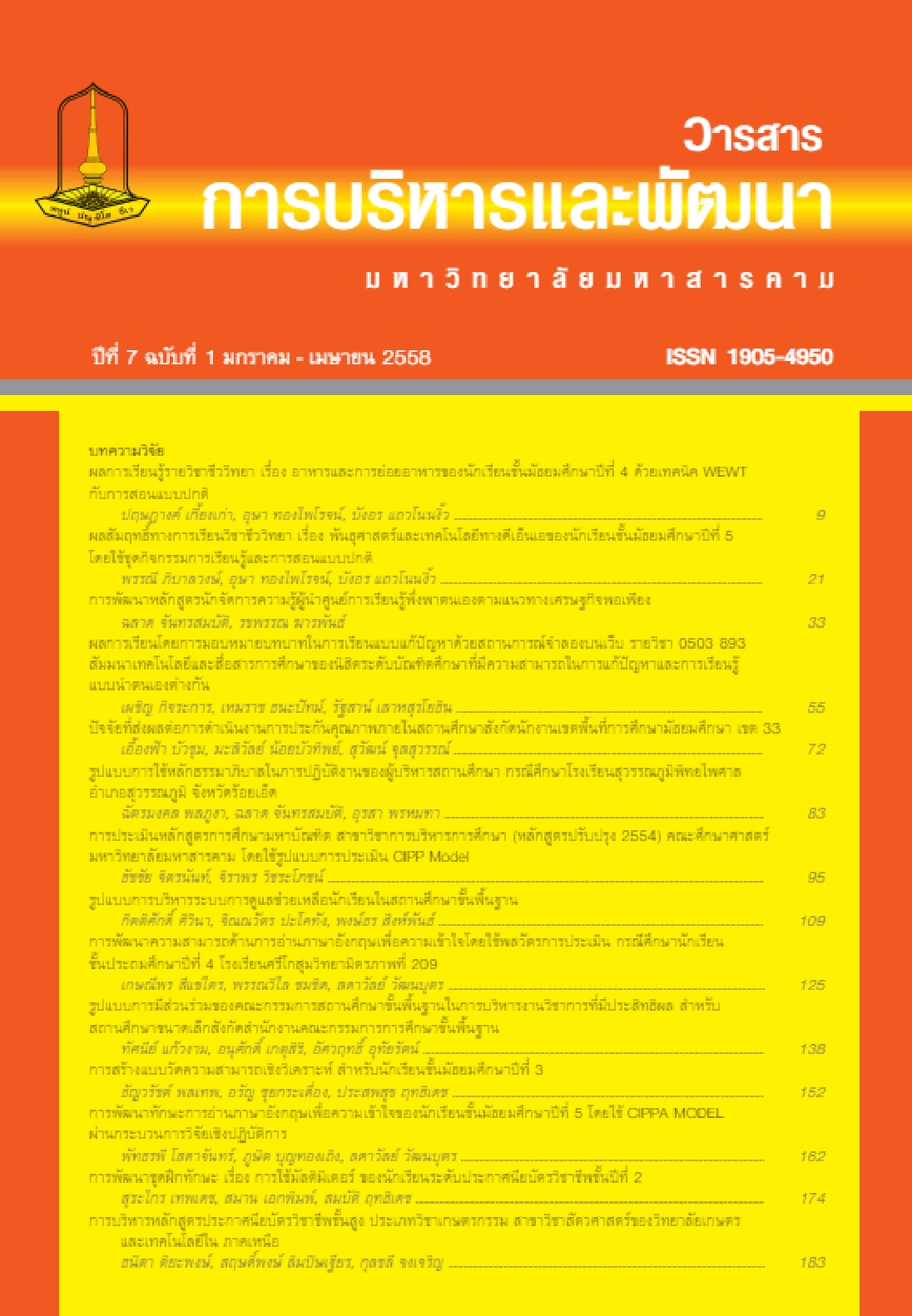การพัฒนาหลักสูตรนักจัดการความรู้ผู้นำศูนย์การเรียนรู้พึ่งพาตนเอง ตามแนวทางเศรษฐกิจพอเพียง
Main Article Content
บทคัดย่อ
การวิจัยครั้งนี้มีความมุ่งหมายเพื่อ 1) ศึกษาสภาพ ปัญหาและความต้องการก่อนการจัดการความรู้ผู้นำการพึ่งตนเองตามแนวทางเศรษฐกิจพอเพียง 2) สร้างและพัฒนาหลักสูตรนักการจัดการความรู้ผู้นำการพึ่งตนเองตามแนวทางเศรษฐกิจพอเพียงเชิง 3) ศึกษาผลการใช้หลักสูตรนักจัดการความรู้ผู้นำการพึ่งตนเองตามแนวทางเศรษฐกิจพอเพียง 4)ประเมินผลการใช้หลักสูตรนักจัดการความรู้ผู้นำการพึ่งตนเองตามแนวทางเศรษฐกิจพอเพียง กลุ่มเป้าหมาย เป็นครอบครัวของเกษตรกรที่ปฏิบัติงานอยู่ในแปลงที่นาและที่สวนของตนเองที่อาสาสมัครเข้าร่วมโครงการ รวมทั้งหมด 26 ครอบครัว จำแนกเป็น (1) ชุมชนวังจาน ตำบลนาข่า อำเภอวาปีปทุม จังหวัดมหาสารคาม จำนวน 10 ครอบครัว (2) ชุมชนหนองแวงและชุมชนคำ บอนเวียงชัย ตำบลหนองแวง อำเภอบ้านผือ จังหวัดอุดรธานี จำนวน 10 ครอบครัว และชุมชนขุมคำ ตำบลหนองปลาปาก อำเภอศรีเชียงใหม่ จังหวัดหนองคาย 6 ครอบครัว ระเบียบวิธีวิจัยเป็นการวิจัยและพัฒนา (Research and Development) ซึ่งใช้การเรียนรู้จากการปฏิบัติ 6 ขั้นตอน เครื่องมือที่ใช้ในการวิจัย 1) เครื่องมือที่ใช้พัฒนางาน ได้แก่ (1) กำหนดการฝึกอบรม 3 คืน 4 วัน หลักสูตรนักจัดการความรู้ ประกอบด้วย ภาคความรู้ ได้แก่ การจัดการความรู้ ภาวะผู้นำ และเศรษฐกิจพอเพียง ภาคปฏิบัติ ได้แก่ แผนพัฒนาคุณภาพชีวิต บัญชีรายครัวเรือน การผลิตปุ๋ยหมัก การผลิตอาหารปลาโดยใช้ไรแดง การปลูกผักหวานป่าและการบริหารศูนย์การเรียนรู้ และภาคความรู้สึก ได้แก่ ความรู้สึก ความสนใจและการนำไปประยุกต์ใช้ (2) คู่มือการพัฒนานักจัดการความรู้ผู้นำศูนย์การเรียนรู้พึ่งพาตนเองตามแนวทางเศรษฐกิจพอเพียง 2) เครื่องมือที่ใช้ในการเก็บรวบรวมข้อมูล ได้แก่ (1) แบบทดสอบวัดผลสัมฤทธิ์ มีค่าความยากง่ายรายข้ออยู่ระหว่าง .55-.81 มีค่าอำนาจ จำแนกรายข้ออยู่ระหว่าง .24 ถึง .81 และมีค่าความเชื่อมั่นของแบบทดสอบทั้งฉบับเท่ากับ .86 (2) แบบประเมินพฤติกรรมนักจัดการความรู้ผู้นำการพึ่งตนเอง (3) แบบบันทึกหลังการปฏิบัติ (AAR) (4) แบบสอบถามความพึงพอใจในการอบรมสัมมนาของนักจัดการความรู้ผู้นำศูนย์การเรียนพึ่งพาตนเองโดยใช้จุดตัด t-test มีค่าอำนาจจำแนกราย ข้ออยู่ระหว่าง 2.30-7.00 มีค่าความเชื่อมั่นทั้งฉบับเท่ากับ .93 และ (5) ตัวชี้วัดความสำเร็จผู้นำศูนย์การเรียนรู้พึ่งพาตนเอง มีค่าความเชื่อมั่นทั้งฉบับเท่ากับ .97 สถิติที่ใช้ ได้แก่ร้อยละ ค่าเฉลี่ย ส่วนเบี่ยงเบนมาตรฐาน t-test และค่าดัชนีประสิทธิผล
ผลการวิจัยปรากฏดังนี้1) เกษตรกรมีที่ดินทำการเกษตร แต่มีหนี้สิน ขาดการจดบันทึกความรู้ในการเรียนรู้จากการปฏิบัติและถ่ายทอด มีความต้องการลดรายจ่ายเพิ่มรายได้ และเป็นนักจัดการความรู้ผู้นำศูนย์การเรียนรู้การพึ่งตนเองในระดับครอบครัว และชุมชน 2) ผลการประเมินทั้งกำหนดการอบรมและคู่มือการพัฒนานักจัดการความรู้ผู้นำศูนย์การเรียนรู้พึ่งพาตนเองตามแนวทางเศรษฐกิจพอเพียง โดยผู้เชี่ยวชาญพบว่า มีความเหมาะสม มีความเป็นไปได้ และมีประโยชน์ อยู่ในระดับมากที่สุด และมีความถูกต้องอยู่ในระดับมาก 3) ผลการพัฒนาหลักสูตรโดยรวมมีประสิทธิภาพของกระบวนการต่อประสิทธิภาพของผลลัพธ์เท่ากับ 86.59/80.75 ซึ่งเป็นไปตามเกณฑ์ที่กำหนดไว้ 4) ค่าดัชนีประสิทธิผลของนักจัดการความรู้ผู้นำศูนย์การเรียนรู้พึ่งพาตนเองโดยรวม มีค่าเท่ากับ 0.6745 ซึ่งแสดงว่านักจัดการความรู้ผู้นำศูนย์การเรียนรู้พึ่งพาตนเองมีความรู้เพิ่มขึ้นร้อยละ 67.45 5) นักจัดการความรู้ผู้นำศูนย์การเรียนรู้พึ่งพาตนเองมีความพึงพอใจต่อการฝึกอบรมสัมมนาโดยรวมอยู่ในระดับมาก และ 6) โดยรวมหลังดำเนินการตามตัวชี้วัดความสำเร็จผู้นำศูนย์การเรียนรู้พึ่งพาตนเองรายครอบครัวแตกต่างกว่าก่อนดำเนินการอย่างมีนัยสำคัญทางสถิติที่ระดับ .01
Downloads
Article Details
เอกสารอ้างอิง
Chantarasombat, Chalard et.al., (2002). Learning Process for Enhancing the Strength of Community Industrial Vocational Group: A Case Study, Local Weaving Group of Namkliang Community, Naka Sub-district, Wapeepatoom District, Mahasarakam Province. Mahasarakam: Learning Network Center and Promotion for Strength of Community and Grounded Economic. Faculty of Education, Mahasarkam University.
Chantarasombat, Chalard. (2007). Development of Knowledge Management Model in Community Organization. Doctor of Education Thesis. Mahasarakam: Mahasarakam University.
Chantarasombat, Chalard. (2008). Development of Lesson Plan and Practice focusing on Student Centered in 0501 803 Educational Management for Local Development. Faculty of Education, Mahasarakam University.
Chantarasombat, Chalard. (2009). Development of Knowledge Management Plan from Practice focusing on Student Centered. Faculty of Education, Mahasarakam University.
Chantarasombat, Chalard. (2010). Knowledge Management and School Management into Learning Organization. Mahasarakam: Mahasarakam University.
Chantarasombat, Chalard. (2011). Developing Learner Centered Action Learning Model, Journal of Social Sciences. 7(4): 635-642, 21 October.
Chantarasombat, Chalard et.al., (2012). A Final Report of Cooperative Development Project In Solving the Poverty Problem, Social and Health Development, Mahasarakam Province, Phase 1 (2011) Research and Development Unit-Community Strength and Knowledge Management. Faculty of Education, Mahasarakam University.
Kampang, Wootikrai. (2014). Model of Learning Source Development by Participation of Basic School Commission: A Case Study of Ku Ka Sing Prachasan School, Kasetwisai District, Roi-ed Province. Master of Education Thesis in Educational Administration, Mahasarakam: Mahasarakam University.
Leupanya, Chanida. (2012). Participatory Model between School and Community in Development of Sufficiency Economy Learning Center: A Case Study of Naka Sub-district, Wapeepatoom District, Mahasarakam Province. Master of Education Thesis in Educational Administration, Mahasarakam: Mahasarakam University.
Manolai, Sawang. (2012). The President of Learning Center in Local Wisdom of Agriculture Development Project based on New Theory focusing on Sufficiency Economy Philosophy. Interview on 11 November.
Manolai, Sawang. (2014). “Learning Center of Sufficiency Economy by Mr. Sawang Manolai” Handbook for Knowledge Manager, the Leader of Self-Reliant Learning Center based on Sufficiency Economy Philosophy: Unit of Research and Development for Community Strength and Knowledge Management, Faculty of Education, Mahasarakam University.
Marquard M.J. (1999). Action Learning in Action: Transforming Problem and People for Word Class Organization Learning. Palo alto: Dares-Black Publishing.
Nonaka, I. and H. Takeuchi. (1995). The Knowledge-creating Company: How Japanese Companies Create the Dynamics of Innovation. New York: Oxford University Press.
Office of Special Committee for Cooperation with Project of Royal Initiation (2007). Principle of Royal Working by His Majesty the King. Bangkok: Royal Academy.
Panich, Wijan. (2005). Knowledge Management: Practitioner Issue. Bangkok: The Institute for Promoting the Knowledge Management for Society (IKS).
Panich, Wijan. (2008). Knowledge Management Practitioner Issue. Bangkok: The Institute for Promoting the Knowledge Management for Society (IKS). 4th ed. Bangkok: Mental Health.
Pratoomma, Chantee. (2012). The President of Combined Agriculture Training Center, Ban Nonerang Burapa, Local Wisdom Network. Interview, 10 November.
Smith, William Robert. (2001). “The levels of Inquiry Matrix in Developing Written Lesson Plans for Laboratory Centered Science Instruction,” Dissertation Abstracts International. 63(2): 3947-A ; August.
Soisraklang, Pai. (2012). The President of Learning Center in Etonoi Community Group, The Center of Sufficiency Economy Agriculture Wisdom. Interview, 10 November.
Wasee, Prawed. (2002). Knowledge Management. Ganjanaburi: The Conference for Outlining the Pilot Project of Knowledge Management. 27 July 2002 at Ganjanaburi Province.


